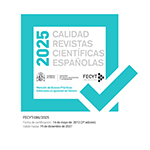Space subjected to time in Franciscan chronicle writing: revisiting the "Conquista Espiritual do Oriente" of Fr. Paulo da Trindade
Abstract
This article explores the Conquista Espiritual do Oriente of Fr. Paulo da Trindade, a major Franciscan chronicle written in Goa in the 1630s. The main focus is on an examination of the articulation between spatial and temporal aspects of the narrative, especially in the chapters describing Ceylon, which constitute a central piece in the symbolic economy of the text and of the Franciscan order as such in the East. A close reading reveals the absolute dominance of time over space and the complete absence of the latter as a structuring element of the narrative. It is argued that this choice makes full sense in the context of the struggles that opposed the Franciscans to the Jesuits in South Asia during the seventeenth century. Nevertheless, it remains to be clarified to what extent the strategy of Trindade can be described as typical of Franciscan chronicle-writing in general.Downloads
Article download
License
In order to support the global exchange of knowledge, the journal Cuadernos de Historia Moderna is allowing unrestricted access to its content as from its publication in this electronic edition, and as such it is an open-access journal. The originals published in this journal are the property of the Complutense University of Madrid and any reproduction thereof in full or in part must cite the source. All content is distributed under a Creative Commons Attribution 4.0 use and distribution licence (CC BY 4.0). This circumstance must be expressly stated in these terms where necessary. You can view the summary and the complete legal text of the licence.












